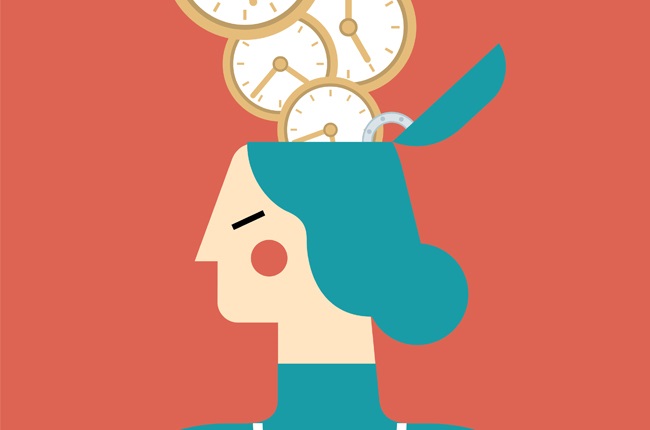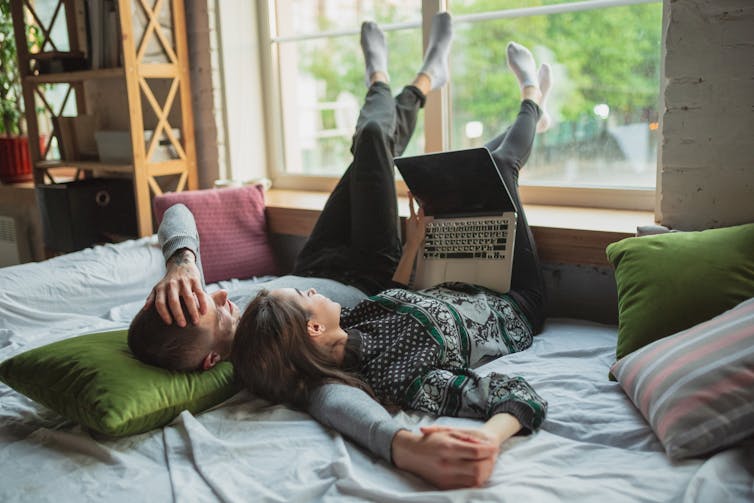
- The perception of time is a psychological phenomenon, meaning external factors can modify the way we experience it.
- Our study found that lockdown probably made it more difficult for us to accurately remember the timing of big events that happened during the pandemic.
- Our findings build on previous evidence of altered time perception during the pandemic by showing that the perception of event timelines is affected as well as duration.
The perception of time is a psychological phenomenon, meaning external factors can modify the way we experience it. For example, time may seem to fly by when we’re in good company, whereas if we’re somewhere we don’t want to be, it may appear to slow.
The Covid pandemic was a source of psychological stress globally, both due to fear of the virus, and the measures taken to contain it. A number of studies have documented distortions to our perception of the passage of time during the pandemic.
In a new study published in PLOS ONE, my student Daria Pawlak and I have found that lockdown probably made it harder for us to accurately remember the timing of big events that happened during the pandemic.
Our starting point was anecdotal comments from our clinical colleagues who were finding it difficult to accurately determine timelines of their patients’ medical conditions. In particular, they felt patients were not correctly reporting events such as the onset of symptoms if they began during the pandemic.
We conducted an online survey in May 2022 with 277 participants from the UK. We asked respondents to give the year in which several notable recent events occurred, such as when Brexit was finalised or when the Evergreen container ship got stuck in the Suez Canal. The events took place from 2017 to 2021, and participants were asked to choose one year between 2016 and 2022.
We also included a questionnaire on factors related to mental health, including anxiety, depression, mental and physical load, boredom and resilience.
READ MORE | Working from home didn't harm mental health at the start of the pandemic -- but things changed later on

We found that participants’ recollection of events in 2021 was worse than for 2019 and 2020, and similar to their recollection of events in 2017 and 2018.
It was expected that participants’ recollection of events that occurred further in the past would be less accurate. But their perception of the timing of events that occurred in 2021 – one year prior to the survey – was just as inaccurate as for events that occurred three to four years earlier.
Importantly, participants who made more errors in event timing were also more likely to report higher levels of depression, anxiety, and physical and mental load during the pandemic, but less resilience. Resilience in this context refers to the degree to which a person can find creative ways of dealing with difficult situations, control their reactions and stay positive in the face of adversity.
One explanation for these findings may relate to how our psychological state alters the perception of the passing of time, such as the perceived “slowing down” of time when there is little to occupy the mind.
READ MORE | By the numbers: What load shedding does to your mental health
An altered timescape
Mental health measures aside, many participants in our research had difficulty recalling the timing of events coinciding with Covid lockdowns.
Interestingly, these findings around poor perception of event timelines are similar to those previously reported for prison inmates.
In the same way that we position ourselves in a landscape using spatial markers (for example, knowing a particular turn in the road we need to take comes after a large tree), we use events – such as birthday celebrations and family holidays – as temporal markers in our “timescape”.
We believe that Covid restrictions, particularly lockdowns, removed these markers that “anchor” us in the timescape, and the absence of these markers distorted our perception of time. We can remember events happening, we just don’t know when they happened.
Our findings build on previous evidence of altered time perception during the pandemic by showing that the perception of event timelines is affected as well as duration (that is, the feeling time is moving more slowly or quickly). Further research is needed to establish whether, now that we’ve emerged from the height of the pandemic, recollection of event timelines has improved.
Arash Sahraie, Chair in Psychology, Head of School of Psychology, University of Aberdeen
This article is republished from The Conversation under a Creative Commons license. Read the original article.




 Publications
Publications
 Partners
Partners












